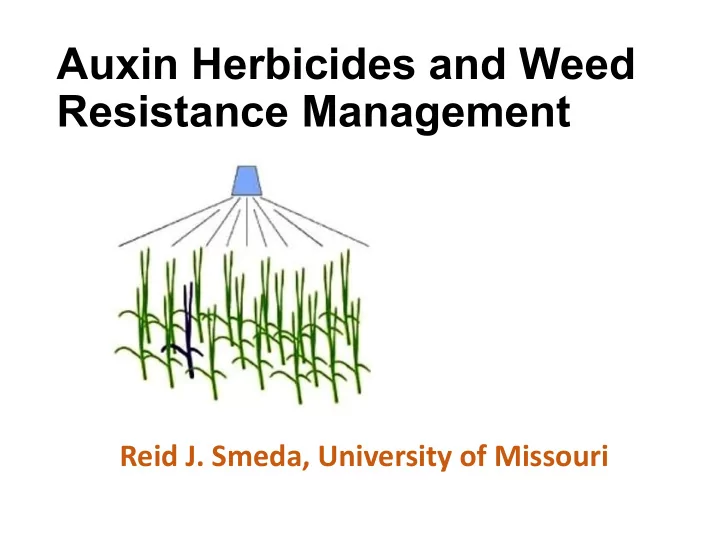

Auxin Herbicides and Weed Resistance Management Reid J. Smeda, University of Missouri
My role: • Overview of herbicide resistance • MOA of auxins • Resistance to auxin herbicides
Remember the theme saying of this past movie? The Highlander
It only takes one! Soybean field adjacent to I-55 in southern Missouri
4 Synthetic auxins
Facts about resistance: • 252 total species (146 dicots, 106 monocots) • 23 of 26 different herbicide modes of action have resistant weeds (163 different herbicides) • 92 crops with reported resistant weeds in 69 different countries
Weeds that used to die no longer all do Nature’s response Crockett County, TN, 2002 Photo -Chism Craig Marestail
Auxins: • Four major classes • Phenoxyalkanoic acids (2,4-D) • Benzoic acid (dicamba) • Pyridines (picloram) • Quinoline carboxylics (quinclorac) • Older chemistries • 2,4-D developed in 1940’s • Dicamba registered in 1967 • Widely used in: • Grass crops (corn, sorghum, cereal grains (wheat) • Turfgrass (industrial, pastures, home lawns) • Burndown ahead of crop planting or in fallow areas • Industrial Vegetation Management (IVM)
Why develop crops resistant to auxin herbicides? • Technological advances • Need; evolution of highly problematic species with multi-MOA resistance (pigweeds, ragweeds, horseweed, kochia) • Systemic, broad-spectrum, highly active
How do auxin herbicides work? 2,4-D IAA (auxin) Dicamba
Roles of auxin: ………………………………………… ……………………………………….. • Phototropism ………………………………………. • Gravitropism • Apical dominance • Fruit development • Abscission • Root development • Concentrated in meristematic tissue
How much auxin induces effects? • As a rooting hormone, auxin initiates effects at 10 ppm • Dicamba applied to broadleaf weeds in soybeans results in 3,995 ppm at the 0.5 lbs ae/A rate.
Physiological response: Auxin herbicides enter the plant cell by imitating natural auxins
Initial response includes leaf and stem movement (24 hours) Dramatic increase in ethylene contributes to visual symptoms
Binding to ARP will initiate a signal transduction pathway that leads to many concurrent events ……………………………………………………………………………………………………………………………………….. Dayan et al., Weed Sci. 2010 ………………………………………………………………………………………………………………………………..
Net result is collapse of plant tissue
Could auxin-tolerant crops lead to selection for resistance? University of Nebraska Lethal dose
What can we learn about glyphosate resistance to avoid repeating history with auxins? • Resistance was never the intent when we developed herbicides • Never say never (no silver bullets) • Rapid adoption of technology (>90% acres) • Effective control does not mean abandon other techniques or herbicide MOA’s • Use the right rate at the right time • (Effectiveness) x (acres treated) x (dependence) = risk
Selection matrix for people to be around the president during World War I: Dr. Mark Lonsdale, CSIRO Active Lazy Clever Front line Good for people strategy Stupid Highly Avoid when dangerous detected
Recommend
More recommend